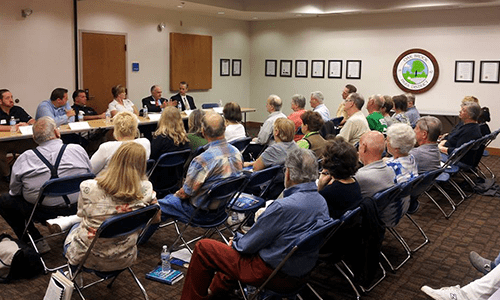By Craig Fink, Alliance Association Financial Services
Board members often feel that their job would be easier if it wasn’t for those “difficult owners”. Owners are an integral part of an association even if some of them occasionally feel like the evil stepmother who is preventing you from going to the ball. So how does a board member find a way to happily co-exist with difficult owners? Or how do you handle those owners who feel the board should be a fairy godmother and expects there to be a magic wand that can be waived to make all of the troubles go away? Going back to the basics could be the answer and the following points can help you along that path.
Communication
The most important skill when working with difficult homeowners is communication. Over the years, I have found that many issues escalate quickly because an owner has a misunderstanding about the facts. When boards have a tough issue to tackle, they may feel that giving too much information can just cause confusion and questions, and nobody wants to solicit additional questions when you haven’t answered the original questions. It is a good policy to always communicate openly and completely, weighing all sides of an issue, before ultimately communicating the position of the board. Most owners will appreciate the honesty and transparency. Sure….there will be questions. You should welcome them, and respond to them in an open and forthright matter. It’s always better to have questions answered out in the open, then to have rumors spreading behind closed doors.
When communicating with owners, it is important to remember that not everyone communicates in the same way. Some people understand by reading, some by listening, and others learn more visually. Don’t be fooled into thinking that writing out a 5 page thesis outlining all of the issues will satisfy everyone. When facing a major issue in your community, plan to communicate with owners on multiple levels. Written information is important, but pictures of the leaky roof or crumbling walls might make a better
story for a certain group. Allow owners to ask questions in an open meeting. Using their own words may make things click for them, and hearing the answers may help another owner to understand. You can keep the same consistent message, just presented in different formats for the benefit of different people.
Education
Hand in hand with communication is education. Just as board members need to be educated to understand any issue, owners also need this education to understand the decisions the board is making in the proper context. As a board member, countless hours are spent soliciting information, reviewing options, and discussing the finer points. While it is always easier to take the “I know best” approach, this attitude won’t instill a great deal of faith in a skeptical owner. When communicating with owners, be honest with yourself and remember all of the work put in to understand an issue. Look at the issue from the owners’ perspective and ask the questions they will most likely ask. Then use your communication with the owners to honestly educate them and help them understand the full perspective. No amount of education and communication is going to make everyone agree, but a good portion of the owners will appreciate the straightforward approach.
Delegation
One last point to consider when working with difficult owners is delegation. While communication and education are vital, some owners simply aren’t going to be satisfied unless they immerse themselves in the issue. You should use this curiosity to the community’s advantage. As board members, we need to realize that even the best community manager and professional team can’t do it all. Committees and Commissions can be a great way to get owners involved to help the board work through difficult issues. Since many owners have an automatic distrust of the board (whether or not they have a good reason to), hearing the perspective of another owner who has been part of a committee or commission might be all the proof they need. As a board member, we also need to consider that the difficult owner may just be right. Even though we try to be experts in everything, allowing other owners to provide input to an issue might provide the additional insight which is needed.
There is, of course, an ulterior motive in bringing owners onto a committee or commission. Ask any board member how they got started on their board and most of them will say it resulted from a single issue with which they became involved. Whether dealing with parking issues, noise complaints, or planning a community event, that owner felt strongly enough to approach the board to start a discussion. Once they became involved, they realized that they had more to offer the community and they chose to run for an open board position. Every board fears the new board member with the “singular focus”, but for many owners that one issue may be their first and only interaction with the board. Bringing owners into the process can help to cultivate future board members and community leaders. For those of us who don’t have a board member waiting list (and who does, really?), you’ll be fostering a process to identify and capture the interest of those potential leaders.
If your community is facing tough issues, and residents are making your life difficult, waiting for Prince Charming to bring your magic slipper is probably a waste of time. Your board meeting may not go until Midnight, but your carriage is going to turn into a pumpkin long before that. So consider your options. Engaging your community with Communication, Education, and Delegation may just allow your community to live “Happily Ever After”.
A version of this article first appeared in the Spring 2012 edition of Common Interest Magazine.








